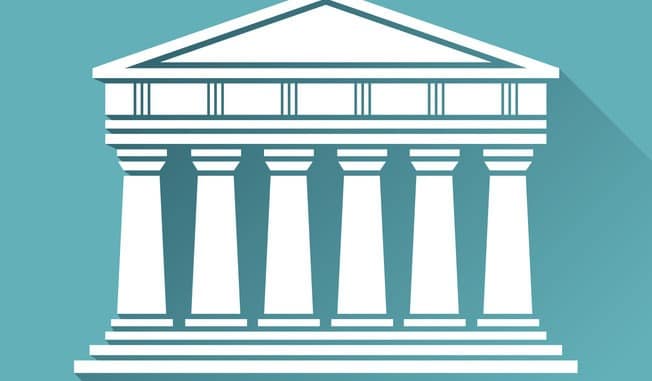
Dr Paul Lambden explores the topic of why, in the days of digital technology, video consultations, a huge pharmacopoeia and vast medical knowledge, it is still interesting to consider how far we have come in the last 2,500 years when probably the greatest physicians of their time were the ancient Greeks
It is hard to assign any relevance to the so-called physicians who learned such medical skills as they had through pupillage from a practitioner. Of course, quacks and imposters abounded, and they would present exuberant images, dangerous and valueless therapies and separate the weak and the hapless from their wealth. It is hardly surprising that the Greek population were sceptical about the medical profession, and many were afraid of allowing someone they did not know anywhere near them when they were unwell, weak or vulnerable. Those practitioners who genuinely tried to help their patients did so by becoming recognisable, wearing plain, clean, simple clothing, avoiding the use of scents, perfumes and jewellery, and desisting from chanting poetry at the bedside.
They had only their questioning, listening to the people describing their symptoms, and what they could feel. They had no microscopes, no stethoscopes, no investigations and no real understanding of the functions of the body. Yet the Greeks laid down some of the scientific principles by which we operate today. They recognised the importance of examination in trying to understand the cause of illness. They identified the concept of lifestyle as a key influencer of good health, and recognised the importance of a good diet, fluid intake, exercise and sleep. They developed the concept of illness related to the environment, and many feel that they were the first physicians to pinpoint the notion of holistic medicine.
The success of the ethical physicians was hampered by the involvement and invocation of the gods by charlatans as a cause, and explanation, of illness. Offending the gods was a diagnosis and explanation for many of the ills of the time for which there was no treatment or cure, other than prayer or sacrifice.
Enter Hippocrates
No consideration of Greek medicine can omit the central and crucial contribution of Hippocrates of Kos, who was born in around 460BC. He wrote extensively, recognised and described many diseases, developed insight into their transmission and prescribed treatments which proved valuable. He emphasised that illness was not the result of godly punishment and he emphasised all the benefits of healthy living. His great wisdom was an inspiration for the many physicians who followed him, and promoted and disseminated his teachings.
However, Hippocrates is best remembered for his greatest achievement, which was his statement of ethical and professional behaviour, embodied in the Hippocratic Oath. Doctors taking the oath do invoke the deity, starting with the statement “I swear by Apollo the healer and by Asclepius and Hygieia and Panacea . . . to keep, according to my ability and my judgement, the following Oath and agreement.”
Legend has it that Apollo, the god of healing, fell in love with the human woman Coronis. She fell in love with another man and Apollo’s sister shot her with an arrow. As she lay dying, she told Apollo that she was pregnant with his child. The legend says that Apollo saved the unborn child, Asclepius, but not Coronis. Hygeia, the goddess of health, and Panacea, the goddess of cures, are daughters of Asclepius. According to the legend Hippocrates is a descendant of one of Asclepius’ sons.
The oath continues, “To consider dear to me, as my parents, him who taught me this art; to live in common with him and, if necessary, to share my goods with him; To look upon his children as my own brothers, to teach them this art.” Still truly relevant, showing respect for teachers, paying their training fees and passing on information to others.
Do no harm
The next section promises the use of treatments, within competencies and never to do harm. “I will prescribe regimens for the good of my patients according to my ability, and my judgment, and never do harm to anyone. I will not give a lethal drug to anyone if I am asked, nor will I advise such a plan and, similarly, I will not give a woman a pessary to cause an abortion.”
The principle of acting in the best interests of the patients remains as strong as ever today. The oath appears to rule out euthanasia, although some experts have suggested it is included to refute the use of doctors as assassins by the state. The reference to an abortifacient pessary might appear strange, as abortion was legal at that time. It is at least possible that the risk of the pessary (wool soaked in chemical) was causing lethal infections hence the reason for advocating its avoidance.
The next sentence, “I will not cut for stone, even for patients in whom the disease is manifest; I will leave this operation to be performed by practitioners, specialists in this art.”, may be the first record of the need for referrals to specialists, and the fore-runner of secondary care!
Hippocrates then addresses conduct. “In every house where I come I will enter only for the good of my patients, keeping myself far from all intentional ill-doing and all seduction and especially from the pleasures of love with women or with men, be they free or slaves.” At this time there was wide distrust of healers and Hippocrates may have included this to allay the fears of the public at a time when quackery abounded.
In the penultimate section the oath addresses confidentiality. “All that may come to my knowledge in the exercise of my profession, or in daily commerce with men, which ought not to be spread abroad, I will keep secret and will never reveal.” As currently, the importance of keeping personal information private was recognised as essential to patient confidence.
Finally the oath recognises the rewards and benefits of meeting the code and the punishment for those who do not. “If I keep this oath faithfully, may I enjoy my life and practice my art, respected by all men and in all times; but if I swerve from it, or violate it, may the reverse be my lot.”
Hippocrates was the first of the great physicians, introducing ethics and standards, many of which still form the mainstay of medical principle today.


Be the first to comment